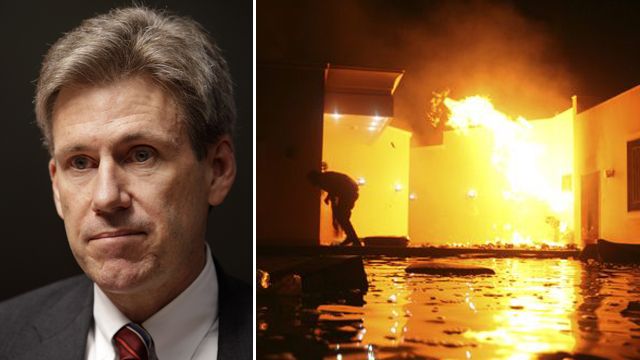Barely a month ago, I wrote an article about the Bloodiest Scandal in America’s History—Operation Fast and Furious. Today, I regretfully admit that Operation Fast and Furious is no longer the bloodiest scandal in America’s history. Several weeks ago, the US Ambassador to Libya was murdered in Benghazi, along with three staffers. Back then, I wrote about the lack of respect our current President has garnered in the world community, and the absence of executive response to the diplomat murders. Since then, events have shifted much further to the treacherous than I even thought possible.
We now know that there was a Navy SEAL, Tyrone Woods, on the roof of the compound during the attack. He had to violate three (!) direct, executive orders just to get there, all the while only trying to save the lives of the Americans inside. Tyrone is one of those guys who exemplifies the very best humanity has to offer. He was one of the greatest men to walk this planet. He has already become a personal hero of mine. He deserves the respect, deep admiration, and love of every single freedom-loving man, woman, and child in the world. Because Tyrone had something that very few men possess. He was not at the compound when the attack happened. He was not serving protection for the Consulate. And therefore, he was under no obligation whatsoever to put his life in harm’s way just to protect the Ambassador.
But Tyrone went anyway. Then he was ordered to stand down—presumably by the Situation Room. Now he was not only free from any obligation to protect the Ambassador, but he was also under orders to stay away from the scene. Tyrone knew that disobeying orders, especially coming from the top of the flag pole, meant he would almost certainly be court martialed, and dishonorably discharged. But he wasn’t a coward like those watching him onscreen in the White House. He counted not his life dear unto himself, choosing to disregard all orders, and threw himself into the middle of the heat in a desperate rescue attempt.
This is how Tyrone ended up on the roof of the US Consulate in Benghazi. In the distance, he could actually see the location from which the lethal mortar rounds were being fired. Realizing that there was firepower in the sky, he did what any good special ops soldier would do. He lazed the target for aerial assault, illuminating his own position to the enemy at the same time. This brave act cost Tyrone Woods his life. But the air support never engaged the enemy. Once again, executive orders had forced the overwhelming American air assets to stand down. In other words, someone—Obama or closely associated—deliberately facilitated the murder of two Navy SEALS, a US Ambassador, and a staff member.
Article Three, Section Three of the United States Constitution defines an act of treason against the United States as such:
“Treason against the United States, shall consist only in levying War against them, or in adhering to their Enemies, giving them Aid and Comfort. No Person shall be convicted of Treason unless on the Testimony of two Witnesses to the same overt Act, or on Confession in open Court. The Congress shall have Power to declare the Punishment of Treason, but no Attainder of Treason shall work Corruption of Blood, or Forfeiture except during the Life of the Person attainted.”
Someone in the White House commanded—more than once—available offensive aerial and ground assets to stand down, refusing them clearance to engage an active enemy attack upon American personnel on the ground. At the very least, this is aiding the enemy.
I do not say this lightly. Charges of treason are perhaps the most serious anyone can direct at a fellow countryman. But I will not be misunderstood here: whoever gave the order to available military assets to stand down must be tried for treason. It’s the least we can do for the brave men who died that day, including the indomitable Tyrone Woods.
Mr. Woods, you may have died without ever seeing that air support engage the enemy. You may have given your life without ever knowing why your own Commander in Chief was abandoning you. But you did not die in vain. You have inspired a generation of Americans to go above and beyond the call of duty, sometimes in the face of evil and perverse leadership. You will be remembered. Your death will be avenged. “Vengeance is mine; I will repay, saith the Lord.” – Romans 12:19.
Today we remember Tyrone Woods, US Navy SEAL; Glen Doherty, US Navy SEAL; Sean Smith, U.S. Foreign Service Information Management Officer; J. Christopher Stevens, U.S. Ambassador to Libya. And our prayers go out to the families of these heroic men as they learn to live without husbands, brothers, fathers, and sons.








